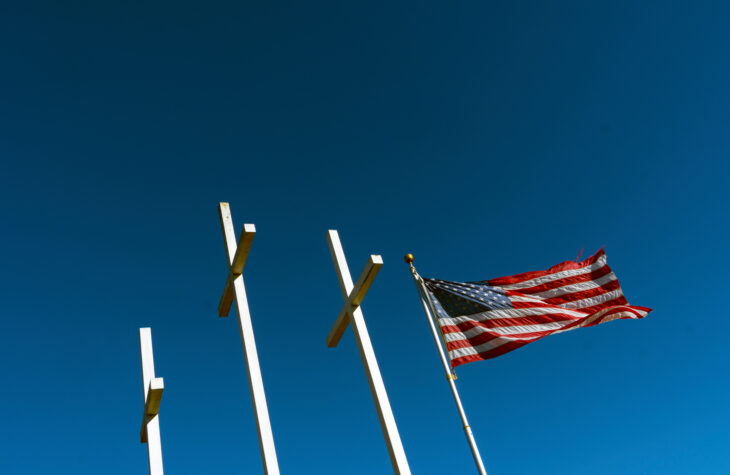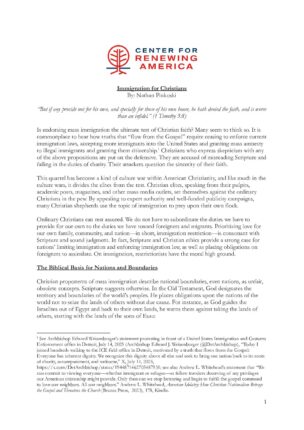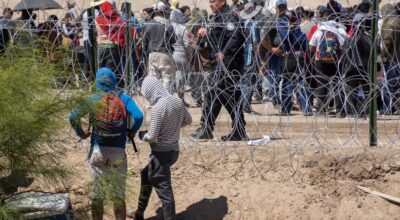
Immigration for Christians
Is endorsing mass immigration the ultimate test of Christian faith? Many seem to think so. It is commonplace to hear how truths that “flow from the Gospel” require ceasing to enforce current immigration laws, accepting more immigrants into the United States and granting mass amnesty to illegal immigrants and granting them citizenship.1 Christians who express skepticism with any of the above propositions are put on the defensive. They are accused of misreading Scripture and failing in the duties of charity. Their attackers question the sincerity of their faith.
This quarrel has become a kind of culture war within American Christianity, and like much in the culture wars, it divides the elites from the rest. Christian elites, speaking from their pulpits, academic posts, magazines, and other mass media outlets, set themselves against the ordinary Christians in the pew. By appealing to expert authority and well-funded publicity campaigns, many Christian shepherds use the topic of immigration to prey upon their own flock.
Ordinary Christians can rest assured. We do not have to subordinate the duties we have to provide for our own to the duties we have toward foreigners and migrants. Prioritizing love for our own family, community, and nation—in short, immigration restriction—is consonant with Scripture and sound judgment. In fact, Scripture and Christian ethics provide a strong case for nations’ limiting immigration and enforcing immigration law, as well as placing obligations on foreigners to assimilate. On immigration, restrictionists have the moral high ground.
The Biblical Basis for Nations and Boundaries
Christian proponents of mass immigration describe national boundaries, even nations, as unfair, obsolete concepts. Scripture suggests otherwise. In the Old Testament, God designates the territory and boundaries of the world’s peoples. He places obligations upon the nations of the world not to seize the lands of others without due cause. For instance, as God guides the Israelites out of Egypt and back to their own lands, he warns them against taking the lands of others, starting with the lands of the sons of Esau:
Do not contend with them; for I will not give you any of their land, no, not so much as for the sole of the foot to tread on, because I have given Mount Se′ir to Esau as a possession. (Deuteronomy 2:5)
Like other nations, Israel is forbidden to take the lands of others without express permission. The boundaries between the world’s peoples and their distinct cultures are likewise preserved. This ensures the preservation of Israel. Israelites cannot become too close to the nations that do not share their cultural and religious presuppositions without compromising their religion, their fidelity to God. Indeed, God sharply commands the Israelites to demarcate themselves from the nations that refuse Him: “You shall not make marriages with them, giving your daughters to their sons or taking their daughters for your sons” (Deuteronomy 7:3).
The territories of nations, and the people within them, can and do change. Some nations are dispossessed of their lands and vanish from history. But for a people to take possession of a new land—or for a people to be dispossessed of its land—requires just cause; possession or dispossession then takes place according to the dictates of God’s will (e.g., Deuteronomy 2:12–24). As Yoram Hazony writes, “The Bible thus puts a new political conception on the table: a state of a single nation that is united, self-governing, and uninterested in bringing its neighbors under its rule. This state is governed not by foreigners responsible to a ruler in a distant land but by kings and governors, priests and prophets drawn from the ranks of the nation itself.”2
National boundaries, divisions, and exclusions are also enforced in the New Testament. When God ordained all the earth’s nations, he gave them a particular vocation:
And he made from one every nation of men to live on all the face of the earth, having determined allotted periods and the boundaries of their habitation, that they should seek God, in the hope that they might feel after him and find him. (Acts 17:26–27)
Hence Christ commands his disciples to go forth and help these nations—with their distinct peoples and cultures—to achieve their vocation and order their community in accordance with the divine law:
Therefore go and make disciples of all nations, baptizing them in the name of the Father and of the Son and of the Holy Spirit, and teaching them to obey everything I have commanded you. (Matthew 28:19–20)
According to the command of Christ, nations as ordered wholes are to be sanctified. They are not broken down into their constituent parts. Likewise, in Revelation, God raises up nations and their representatives. If they shepherd their nation and fulfill its Christian vocation, these representatives will be in Heaven.
The Old Law: What We Owe to Sojourners and Foreigners
Christian proponents of mass immigration try to amass scriptural support for their position by looking at God’s precepts to the Israelites. In the Mosaic Law and throughout the Old Testament, God commands special duties of love to foreigners and migrants. Supporters of mass immigration are correct to argue that our actions toward a foreigner or migrant must be bound by the dictates of justice and charity: “You shall not do him wrong” (Leviticus 19:33).
But we need to understand what those specific duties are. Scripture distinguishes between different kinds of foreigners, to whom we have distinct duties:
He executes justice for the fatherless and the widow, and loves the sojourner, giving him food and clothing. Love the sojourner therefore; for you were sojourners in the land of Egypt. (Deuteronomy 10:18–19; cf. Leviticus 23:22; Deuteronomy 24:20–21)
Some translations use “foreigner” rather than “sojourner,” but this translation is misleading. “Foreigner” is the better translation for a different set of words, such as nekhar or zar; these words refer to a person who could be an invader, squatter, temporary worker, or another kind of migrant.3
In the above passage, the Hebrew word used is ger, which refers to someone who has formal permission to reside in the country. This was true of the Israelites in Egypt, as Pharaoh had granted them formal permission to reside there to escape the famine that plagued their own country. In modern terms, the person who has formal permission to reside in another’s land is a resident alien. So the foreigner being treated “as native among you” (Leviticus 19:34) applies to that category of persons who honor their host nation. And even if there are special duties of charity toward the sojourner, as there are toward the poor, these do not entail any special judicial or legal exemptions, or other forms of favoritism (see Exodus 23:2–3).
The duties to the foreigner in this sense are narrower than the duties to the resident alien, the sojourner. God extols his people to rest on the Sabbath so that the foreigner working for them may also rest (Exodus 23:12), he commands fair judgment of the foreigner in legal proceedings (Deuteronomy 1:16), and he permits ritually unclean food to be given to foreigners (Deuteronomy 14:21). These commands indicate that according to the Old Law, one has a distinct set of duties toward the foreigner as opposed to the sojourner who resides among the Israelites. Moreover, these distinctions are not invoked casually or arbitrarily. Only the lawful authority of a political community may decide when a foreigner becomes a resident alien. In the case of the Israelites, it was Pharaoh who granted Joseph’s request, rendering the Israelites sojourners in the land of Egypt (Genesis 47:4–6). The personal obligation to treat a resident alien “as native among you” governs a moral relation. It does not change the alien’s juridical status. To justify changing the juridical status of a resident alien to that of a native requires the former to fulfill certain obligations outlined in several passages of Scripture. That alien must integrate.
The Old Law: What Sojourners and Foreigners Owe to Their Hosts
First, sojourners and foreigners have a duty of obedience to the law. In Israel, there are no exceptions, inconsistent applications, or multiple standards applied to Israelites, sojourners, and foreigners. All are subject to one legal code, which God commands to be enforced uniformly (Exodus 12:49; Leviticus 18:26; Leviticus 24:22). Everyone within Israel is to be taught obedience to this same law, learning to fear it and God (Deuteronomy 31:12).
Second, sojourners residing in Israel have a duty to strive toward Israel’s common good and to support the lawful authorities in their actions. The Israelites modeled this themselves in their original dealings with Pharaoh and during the Babylonian captivity. Even though they are exiles, they are admonished to work for the prosperity of the country in which they reside (Jeremiah 29:1–7).
Third, the sojourners residing in Israel on a permanent basis are expected to assimilate both in culture and religion.4 Non-native Israelites are encouraged to assimilate by participating in the nation’s prayers and offerings (Numbers 15:14; Isaiah 56:5–8). When one joins in these rituals and worships the nation’s God, one becomes an Israelite. This is what Ruth the Moabite does, binding herself to her Israelite mother-in-law, Naomi, and to Naomi’s people and faith (Ruth 1:16). While the nation permits the presence of those who do not believe within its territory, it welcomes those who convert to full membership, joining the nation’s people.
For these reasons, even those who are the most enthusiastic about emphasizing Christians’ duties toward migrants note in their more thoughtful statements the duty migrants have to integrate, and the duty of host countries to ensure this integration. Tim Keller rightly emphasizes Ruth’s desire to join her new people regardless of whether or not she gets an easier life: Her attitude is not one of expecting material gain but of fulfilling the obligations placed on her by her hosts: “May the Lord deal with me.”5 “Integrate,” for Pope Francis, is one of the proper responses to migrants, and this imperative takes into account the need for host countries to “preserve their respective cultural and religious identity.”6 This is exactly what Scripture teaches.
Rule of Law and Penalties for Breach of Duties
Christian proponents of mass immigration often argue that immigration laws should not be enforced, that punishing immigrants for breaking such laws is unjust, and that excluding from citizenship migrants who are in the country illegally is also unjust. But as far as the Old Testament is concerned, the basis for this position is extremely weak.
In enforcing the same set of laws on those within Israel, God commands that those who break the law be cut off from the people; this punishment can involve imprisonment, ostracization, exile, deportation, or death:
But the person who does anything with a high hand, whether he is native or a sojourner, reviles the Lord, and that person shall be cut off from among his people. Because he has despised the word of the Lord, and has broken his commandment, that person shall be utterly cut off; his iniquity shall be upon him. (Numbers 15:29–30)
For those who are not full members of the community, punishment includes stripping membership rights. Moabites are excluded due to their unjust actions in the past against Israelites (Deuteronomy 23:3–4). The Gibeonites deceitfully claim that they are refugees from a distant nation, taking advantage of Israel’s generous hospitality. When their deceit is exposed, their punishment is servitude, not membership (Joshua 9:21–27).
How the New Law Transcends Rather Than Abolishes the Old Law
The Old Law distinguishes carefully between those who are members of the nation and those who reside in it—sojourners—or those who pass through it—foreigners. It places distinct duties upon sojourners and foreigners, as well as upon the host nation. These duties have the goal of preserving the nation’s integrity and ensuring that it rightly worships God. Those who wish to do likewise can join, but those who do not are excluded from the full benefits of membership.
One might concede that all of this is true—but argue that it is rendered irrelevant by the coming of Christ. Indeed, the New Law appears to dispense with such divisions. Christ recasts the Old Law as two commandments: to love God and “to love your neighbor as yourself” (Mark 12:31; cf. Matthew 22: 37-39). The latter appears to dissolve love for one’s own into love for all of humanity writ large; as told in the parable of the Good Samaritan, each person, foreigner or native, appears as my neighbor, without exception. Finally, it would seem that Christians are called to recast all their allegiances, including familial and national allegiances, into a new kind of international nation. Christians are a “nation” of people taken from every nation (1 Peter 2:9). St. Paul seems to describe vividly a world where thanks to Christianity, cultural and national identities vanish: “Here is neither Jew nor Gentile, neither slave nor free, nor is there male and female, for you are all one in Christ Jesus” (Galatians 3:28). The distinction between members of the nation and foreigners likewise vanishes; as Paul writes, “So then you are no longer strangers and sojourners, but you are fellow citizens with the saints and members of the household of God” (Ephesians 2:19). Such passages are used to argue that more migrants should be granted American citizenship.7 In short, the New Law’s universalism seems to demand that Christians create one polity, devoid of old national and cultural particularities.
But we need to take more careful stock of these statements, starting with Galatians 3:28. Paul isn’t telling us to cease thinking of ourselves as slaves (where such exist), as male or female, or as Jews (if we are of Jewish origin). In Ephesians 6:5, he tells slaves to “be obedient to those who are your earthly masters, with fear and trembling, in singleness of heart, as to Christ.” In Ephesians 5:23, he distinguishes between husband and wife and the duties consonant to each: “For the husband is the head of the wife as Christ is the head of the church, his body, and is himself its Savior.” And in Philippians 3:4–5, he embraces his Jewish origins: “If someone else thinks they have reasons to put confidence in the flesh, I have more: circumcised on the eighth day, of the people of Israel, of the tribe of Benjamin, a Hebrew of Hebrews.” Christian universalism does not cancel out our particularities. As Paul’s own words suggest, they are given through Christ a new, fuller significance.
Ephesians 2:19 likewise describes our spiritual membership in the Church, built on the saints, the apostles, and Christ. The passage does not describe a readily applicable political order. Such an order can still be legitimately arranged—after all, Paul urges obedience to the laws and governing authorities (Romans 13:1). Membership in the heavenly city does not discount our membership in the earthly cities or nations to which we belong. Membership in these two distinct communities might place different demands, which may sometimes conflict (Matthew 22:21). But the way we define membership in the Church—the community of believers—does not need to be copied exactly in the way we organize our political order.
Because the New Testament does not provide a blueprint for how we should arrange society, the central issue is determining the moral grammar of Scripture: the implicit and explicit moral principles that can be drawn from Scripture, which in turn help us grasp the meaning of some of the basic parables and passages.
Three Key Moral Precepts for Thinking about Immigration
There Is an Order of Charity
As the parable of the Good Samaritan illustrates, it is correct to argue that the New Law calls us to love everyone, without exception. Yet this cannot entail in practice an equal concern for everyone—not least because both the Old and New Law command a special set of duties to those nearest to us. In the first place, we are commanded by the Decalogue to fulfill a special precept of love—honor—towards our mother and father. We are then called to love our husband or wife in a special manner (in Ephesians 5:28, Paul writes that “men ought to love their wives as their own bodies”). This love should be greater than love towards other friends and acquaintances. Ordering our loves is critically important; this is why St. Augustine describes the briefest, truest definition of virtue as the ordo amoris.8 Scripture demonstrates this perhaps most forcefully in 1 Timothy 5:8: “But if any provide not for his own, and specially for those of his own house, he hath denied the faith, and is worse than an infidel.”
Commenting on this passage, St. Thomas Aquinas argues that loving those who are close to us is necessary to fulfill the duties of charity. This love begins with our blood relations, then extends to our fellow citizens. We are called to additional duties of charity toward those who are close to us:
This very act of loving someone because he is akin or connected with us, or because he is a fellow-countryman or for any like reason that is referable to the end of charity, can be commanded by charity, so that, out of charity both eliciting and commanding, we love in more ways those who are more nearly connected with us.9
Other passages in the Gospels allude to sacrificial acts of love, with Christ speaking of laying down his life for his friends (e.g., John 15:12–13). It can be difficult to extract moral precepts from these statements, since they are first and foremost intended to foretell Christ’s own death and it will accomplish. But the example to emulate is the sacrifice for one’s friends, not just anyone. It is admirable to sacrifice for particular persons in proximity to us—friends, with whom we share a vision of what is good. This lesson on the importance of proximity is a key theme of the parable of the Good Samaritan: The Levite and the scribe fail to respond to the one closest to them. If there are scriptural implications here that pertain to migration, they pertain to weighing occasions to sacrifice for our friends and political friends—those within our community, with whom we share historic ties—rather than for newcomers. “Forsake not an old friend, for the new will not be like to him” (Sirach 9:14).
Love Yourself
When Christ’s command to love your neighbor as yourself is invoked in immigration debates, emphasis is usually placed on “your neighbor.” That can be misleading: We should love ourselves more than our neighbors. This conclusion may seem counterintuitive from a Christian perspective, but Aquinas persuasively argues for it:
Whence it seems to follow that man’s love for himself is the model of his love for another. But the model exceeds the copy. Therefore, out of charity, a man ought to love himself more than his neighbor.10
This is not a justification for selfishness. Aquinas’s point is rather that we must first and foremost order ourselves toward love of God. A man loves himself in charity in the first place because he accepts that as someone created in the image and likeness of God, he shares in the principle of goodness upon which charity is founded: God. Our love for God means that even though we love our neighbor and wish to free him from sin, this desire to free our neighbor from sin does not extend to sinning ourselves, even if that might somehow free him from sin. We can make physical sacrifices for our neighbor, but not spiritual ones. In this sense, we love ourselves more than our neighbor.
Aquinas’s principle helps us see the problem in arguments for mass immigration that are premised upon holding Americans responsible for the country’s actions abroad, blaming them for past mistakes and encouraging them toward self-chastisement and guilt. In this picture, increasing immigration is a way to atone for the country’s foreign policy mistakes.11 Yet this guilt is misplaced and ultimately disobeys the Gospel’s command. To love your neighbor as yourself, you cannot be ashamed of your proper, natural loves: who you are, who your parents and family are, and who your countrymen are. Self-hatred cannot form the basis of a call to love others more. You cannot succeed in fulfilling your duties of charity toward others when you fail in the duty of charity toward yourself.
The Common Good of a Community Precedes the Good of the Individual
In our actions, we must weigh the common good, the good of a community, over an individual’s particular good. This is not utilitarianism or collectivism: It’s the demand of charity. As St. Augustine says, the expression “‘charity seeks not her own,’ means that it prefers the common to the private good.” Because the good of the whole is objectively more lovable than an individual’s own good, charity is ordered to the common good beyond that of one’s own good.12 And in so acting toward the common good, our actions ensure the achievement of individual goods.
Consider, for example, how an individual might ensure his self-preservation. Personal security is certainly a good, but it is best secured by pursuing the common good. In a political community, the common good of security requires a functioning legal system that people trust, including a criminal justice system that enforces its laws consistently and fairly. In the absence of that stability, trust breaks down; individuals look to extrajudicial actors to guarantee their safety and security. This consequence undermines legitimate authorities, sets up competing authorities who vie for power, and makes individuals less safe. For this reason, prioritizing the common good—assuring civic order, rule of law, and stability—ensures the achievement of an individual good: personal security.
Some proponents of illegal immigration, as well as excessive legal immigration, invert this logic by prioritizing the individual’s personal security or aspiration for a better life over and above civic order. This posture has played a role in breaking down social trust and the trust in lawful authorities, as well as producing a number of other social harms.13
The priority of the common good seems to run counter to our emphasis on individual rights. For instance, it is on the basis of personal security that international law supports an individual’s right to emigrate, on the basis that someone should be able to flee war, prosecution, and other forms of violence. But if we prioritize the common good, we understand that letting such people into our country is not the only way to fulfill the duty of charity. For those whose personal security might be threatened, it is often more beneficial to assist people to live well in their proper country by preserving or trying to restore the civic conditions of peace. This approach ensures that people can stay in or return to their homes. Again, many proponents of mass immigration acknowledge that this may be the better course of action. Pope Francis wrote that “ideally, unnecessary migration ought to be avoided; this entails creating in countries of origin the conditions needed for a dignified life and integral development.”14 Rev. Gabriel Salguero, the president of the National Latino Evangelical Coalition, has similarly argued for supporting people in their own countries, preventing migration by encouraging them to stay there.15
Two Mistaken Theological Postures
Many of our erroneous judgments on immigration are not only due to misunderstanding key precepts in Christian ethics. They stem from some more fundamental theological mistakes that we must take care to avoid.
Divinizing the Migrant
In the thinking of many Christians, the migrant is Christ: the stranger welcomed (Matthew 25: 35–36). Others repeat the line that “Jesus is a refugee.”16 While these observations are themselves not erroneous, the dangerous next step is to extract from them a whole worldview. Those who make this mistake begin to interpret migration eschatologically, as a “sign of the times,” and then privilege migration itself as a special anthropological state, the basis for a new kind of theology and new kind of human existence.17 But just as it would not be sensible to proceed from identifying Christ with the prisoner in Matthew 25 to eulogizing imprisonment, so we should be wary of similar hasty connections that eulogize migration.
The danger is that the migrant assumes the place that the proletariat once filled in Marxism or Marxist-inflected liberation theology, endowed with special consciousness and world-historic significance.18 It’s theologically risky to interpret recent events or trends in eschatological terms; it’s also dangerous to transform the migrant into a messianic figure, a character whose liberation promises to lead us into a better world. We must not look for human substitutes for the Messiah: Christ alone delivers us. The migrant is not our God.
Forgetting the Reality of Collective, Temporal Punishment
Just as God warns us of the eternal punishment that comes from breaking His commandments, so He warns His people that temporal punishment comes if they do not follow His commandments. For God’s people, this punishment takes the form of national dispossession. Hell—dispossession—is real.
While God subjects the sojourners and Israelites to the same law and encourages the former to follow it, His commands do not dissolve the difference between the two. In His land, His people—not the sojourners—rule. He warns His people that if they are disobedient, that relationship will be inverted:
The sojourner who is among you shall mount above you higher and higher; and you shall come down lower and lower. He shall lend to you, and you shall not lend to him; he shall be the head, and you shall be the tail. (Deuteronomy 28:43–45)
A recalcitrant people sees its lands, heritage, homes, and treasures turned over to foreigners:
Remember, O Lord, what has befallen us; behold, and see our disgrace! Our inheritance has been turned over to strangers, our homes to aliens. (Lamentations 5:2)
They are displaced in their own lands, witnesses to the destruction that enemy invaders bring:
Your country lies desolate,
your cities are burned with fire;
in your very presence
aliens devour your land;
it is desolate, as overthrown by aliens.
And the daughter of Zion is left
like a booth in a vineyard,
like a lodge in a cucumber field,
like a besieged city. (Isaiah 1:7–8)
And they take one’s most cherished cities and take control of them, ruling them as their own:
On the day that you stood aloof, on the day that strangers carried off his wealth, and foreigners entered his gates and cast lots for Jerusalem, you were like one of them. (Obadiah 1:11)
Highlighting these dangers need not take us away from our duties of charity to aliens and foreigners. But we should pray to remain faithful stewards of God’s law, so that our people may be delivered from dispossession and the risk of disappearing from the earth.
Conclusion: Recovering Christian Statecraft
When it comes to immigration, sentimentalism based off of cherry-picked selections from Scripture has skewed the judgment of many Christians. As the Center for Renewing America’s founder Russell Vought has argued, this sentimentalism has distorted our ability to discern our specific duties of justice and charity. Slogans and clichés have led Christian leaders to slander their own flock, producing divisions in the Church. And this conflict has damaged the Church’s credibility in the public’s eyes. Faced with the crisis of a failed immigration system, unenforced laws, and a deliberate strategy to flood the country with migrants, Church officials and intellectuals have either looked the other way or preferred to chastise those in politics who are trying to restore the rule of law in the country. These actions have weakened the Church’s moral authority.19
We need forthright discussions and serious discernment to see the effects of mass immigration on our political community and to repair the damage. To be sure, acting well is not easy; it requires vigilance and careful judgment. That’s what we should expect: “Behold,” says Christ, “I send you out as sheep in the midst of wolves, so be wise as serpents and as innocent as doves” (Matthew 10:16). Yet whatever the challenges are, we can draw moral confidence from Scripture to achieve a wise, prudent policy of border control and immigration restriction, fulfilling our duties of justice and charity as well as our responsibilities to our community and nation.
Endnotes
1. See Archbishop Edward Weisenburger’s statement protesting in front of a United States Immigration and Customs Enforcement office in Detroit, July 14, 2025 (Archbishop Edward J. Weisenburger (@DetArchbishop), “Today I joined hundreds walking to the ICE field office in Detroit, motivated by a truth that flows from the Gospel: Everyone has inherent dignity. We recognize this dignity above all else and seek to bring our nation back to its roots of charity, accompaniment, and welcome,” X, July 14, 2025, https://x.com/DetArchbishop/status/1944871462705487931; see also Andrew L. Whitehead’s statement that “We can commit to viewing everyone—whether immigrant or refugee—as fellow travelers deserving of any privileges our American citizenship might provide. Only then can we stop betraying and begin to fulfill the gospel command to love our neighbors. All our neighbors.” Andrew L. Whitehead, American Idolatry: How Christian Nationalism Betrays the Gospel and Threatens the Church (Brazos Press, 2023), 178, Kindle.
2. Yoram Hazony, The Virtue of Nationalism, 2nd ed. (Basic Liberty, 2025), 19.
3. For more information on this and some other passages discussed in this brief, see James K. Hoffmeier, “Wise Welcome: A Bible Study on Immigration,” 2020, https://americanevangelicals.com/wp-content/uploads/2020/06/Wise-Welcome-Bible-Study-2020-J-Hoffmeier-4.0.pdf.
4. John Bergsma and Brant Pitre, A Catholic Introduction to the Bible: The Old Testament (Ignatius Press, 2018), 342.
5. Tim Keller, host, Gospel in Life, “An Immigrant’s Courage,” October 19, 1997, https://podcast.gospelinlife.com/e/an-immigrant-s-courage/.
6. Francis, Fratelli Tutti [Encyclical Letter on Fraternity and Social Friendship], The Holy See, October 3, 2020, sec.129, https://www.vatican.va/content/francesco/en/encyclicals/documents/papa-francesco_20201003_enciclica-fratelli-tutti.html.
7. “We, who now ‘are no longer foreigners and strangers, but fellow citizens with God’s people and also members of his household’ (Eph 2:19), might remember the grace we have received on a cosmic scale and, corporately, seek appropriate ways to extend to those who seek it the much smaller grace of being allowed to pursue citizenship in the United States.” Matthew Soerens, Jenny Yang, and Leith Anderson, Welcoming the Stranger: Justice, Compassion & Truth in the Immigration Debate (InterVarsity Press, 2009), 93.
8. Augustine, The City of God, 15.22.
9. Thomas Aquinas, Summa Theologica IIa IIae qu. 26 ar. 7.
10. Thomas Aquinas, Summa Theologica IIa IIae qu. 26 ar. 4.
11. “Americans should not forget that the United States bears some responsibility for many people’s displacement. Our country’s various military and economic quests have led us to pursue policies that impoverished and, in some cases, destroyed the native lands of those coming to our shores. Acknowledging our complicity in that history is vital, and it can lead us to take more seriously our responsibility to follow the commands to love and serve the immigrant and refugee among us.” Whitehead, American Idolatry, 162.
12. See Thomas Aquinas, Summa Theologica, IIa IIae q. 26 a. 4.
13. James Orr helpfully summarizes many of the ways that an inverted priority on the individual good of the migrant damages the community’s common good: “Rapid unvetted migration at scale harms citizens. It depresses working-class wages. It strains public services. It sustains the vast criminal networks that make up the human trafficking industry. It facilitates the flow of drugs that are killing tens of thousands every year. It erodes civic trust. It gradually dissolves the shared heritage of a people—its norms, its traditions, its language, its culture—to the point where it can no longer use the first-person plural. And it harms the migrants’ countries of origin by draining them of the very citizens who would make poor countries less poor.” James Orr, “Is the Foreigner My Neighbor? A Christian Dialogue on Immigration,” First Things, April 15, 2025, https://firstthings.com/is-the-foreigner-my-neighbor-a-christian-dialogue-on-immigration/.
14. Francis, Fratelli Tutti, sec. 129.
15. “If we’re concerned with immigration, shouldn’t we also be concerned about how foreign aid helps people stay in their country and flourish?” Nicole Acevedo, “Some Evangelical Leaders Challenge Trump’s Immigration and Foreign Aid Policies amid Calls for Unity,” NBC News, February 6, 2025,
16. The best way to respond to this line is to affirm it. Yes, Jesus was a refugee, because he fled his country when his life was in danger and he returned home after several years, when the danger had passed. This raises a set of questions: Do modern refugees do likewise, returning to their home country when the dangers have passed? Jesus’s family fled because the life of their son was in danger, not because his family wanted a higher standard of living. Are modern migrants subject to a similar danger? Or are they simply aspiring for a better economic situation? Are we concentrating our resources and attention to assist the former? Are we willing and able to assist refugees to return home? Or do we spurn practices of repatriation and remigration and pursue unfeasible settlement schemes?
17. “We can therefore consider the present-day phenomenon of migration a significant ‘sign of the times’, a challenge to be discovered and utilised in our work to renew humanity and proclaim the gospel of peace.” Pontifical Council for the Pastoral Care of Migrants and Itinerant Peoples, Erga Migrantes Caritas Christi [The Love of Christ Towards Migrants], Vatican City, 2004, https://www.vatican.va/roman_curia/pontifical_councils/migrants/documents/rc_pc_migrants_doc_20040514_erga-migrantes-caritas-christi_en.html. Note that Pope Paul VI affirmed the legitimacy of national groups in Pastoris Migrantorum Cura [Motu Proprio on the Pastoral Care of Migrants], The Holy See, August 15, 1969, https://www.vatican.va/content/paul-vi/la/motu_proprio/documents/hf_p-vi_motu-proprio_19690815_pastoralis-migratorum-cura.html.
18. In liberation theology, Christian soteriology is replaced with an anthropological, quasi-Marxist one. “The analysis is for the Marxist an instrument of criticism, and criticism is only one stage in the revolutionary struggle. This struggle is that of the proletarian class, invested with its mission in history. Consequently, for the Marxist, only those who engage in the struggle can work out the analysis correctly. The only true consciousness, then, is the ‘partisan’ consciousness.” Joseph Cardinal Ratzinger, “Instruction on Certain Aspects of the ‘Theology of Liberation,’” Congregation for the Doctrine of the Faith, August 6, 1984, https://www.vatican.va/roman_curia/congregations/cfaith/documents/rc_con_cfaith_doc_19840806_theology-liberation_en.html.
19. Russell Vought, “The Executive Branch and Immigration,” Theology of American Statecraft Conference, posted September 26, 2023, by American Moment, YouTube, 17:41, https://www.youtube.com/watch?v=RZT6-Tasrd4.





